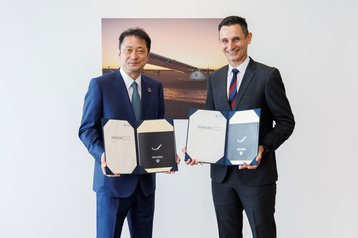SoftBank is partnering with real estate group Lendlease to explore the use of High Altitude Pseudo Satellites (HAPS) in Australia.
The Japanese telco's HAPSMobile subsidiary is developing a solar-powered fixed-wing HAPS platform from which to offer connectivity services. The company has done five successful test flights of a 78m wingspan drone and aims to begin commercial operations – mostly in the form of wholesale services to operators – around 2023.
This week HAPSMobile, a subsidiary of SoftBank Corp. and Lendlease commemorated an agreement to form a joint venture that will explore the deployment of HAPS in Australia.
The Sydney-based joint venture, HAPSMobile Australia Pty Ltd, was established in April to study the business potential of HAPS in the Australian market. After a number of successful past test flights, HAPSMobile is now exploring business opportunities in a number of markets with an aim to future commercial services.
Lendlease Asia has been providing telecommunications and data infrastructure services to SoftBank, HAPSMobile’s parent company, in Japan for more than 20 years. SoftBank said the JV will see Lendlease acting as facilitator, adding value through its understanding of the Australian market.
Junichi Miyakawa, President & CEO at both SoftBank Corp. and HAPSMobile, said: “We’re excited to be collaborating with Lendlease, a company with a strong track record and extensive expertise in Australia. With its large landmass, much of Australia is still without mobile network coverage. That’s why we believe HAPS-based solutions could be optimal for industrial IoT, emergency communications and other applications in addition to providing broadband for rural communities. We look forward to studying the business potential of HAPS in the Australian market with Lendlease.”
HAPS – whether they be airships, balloons, or fixed-wing drones – offer a way to provide connectivity to rural and unconnected areas without the upfront costs of cell towers or satellites or the need for specialist receivers. Google/Alphabet's now-defunct high altitude balloon unit Project Loon was probably the most famous example, but a number of companies are looking to develop a successful platform in the space.
SoftBank has made a large number of investments in the space in recent years. The company was an investor in Loon – and acquired some of the unit’s patents in the wake of its closure – but also set up HAPSmobile in 2017 in conjunction with US military drone firm AeroVironment. It has also invested across a number of other sky-based companies; as well as HAPS, it has investments in both Low Earth Orbit LEO and Geosynchronous Earth Orbit (GEO) satellite firms and even aerostats (tethered blimps).
In June 2021, SoftBank launched its own Non-terrestrial Network (NTN) service to provide connectivity solutions from high altitudes and orbit.
“We have a long-standing relationship with SoftBank in Japan that goes back to 2002,” added Andrew Gauci, Lendlease Managing Director of Japan and Head of Telecoms & Data Infrastructure Asia. “We believe in applying our industry expertise and working collaboratively with partners to seek new opportunities. We are excited to be partnering with SoftBank’s subsidiary HAPSMobile to explore this opportunity further.”







